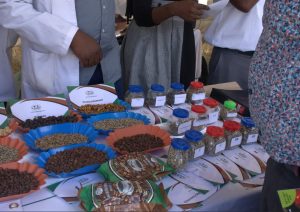The Kenya Agricultural and Livestock Research Organisation (KALRO) has implemented a national coffee planting campaign that aims to increase coffee seed production from the current 5000 kg cumulative of all varieties to 15,000 kg by the year 2027/28.
The crop has been identified as one of the pillars in the agricultural crops in the Bottom-Up Economic Transformation Agenda (BETA) to support revenue generation through increased production and KALRO is at the forefront to support these national actions.
Speaking during the 3rd KALRO-CRI Open Week launched at the Ruiru Coffee Fair event held at the Coffee Research Institute Jacaranda, KALRO Deputy Director-crop Dr. Felister Makini said this year’s theme is, “Advancing agricultural innovation for resilient food systems and sustainable livelihoods”.

“Similar occasions will be held in all our 17 KALRO Centres and Sub-Centres to widen and deepen the reach of stakeholders of different agricultural and livestock value chains,” said Makini.
The KALRO director added that such activities are meant to teach stakeholders new technologies and improve their skills in coffee management practices along the value chain.
In addition, stakeholders, including farmers, will also get information on where and how to market their coffee, obtain financing, acquire farm inputs and equipment, and obtain processing machinery.
Furthermore, in such forums, researchers also pick up challenges in the coffee industry that they need to address for the betterment of the industry.
She cited that in Kenya, coffee is the 5th top foreign exchange earner in terms of export after diaspora remittance, Tea, Horticulture and Tourism and contributes about 0.3% of the country’s GDP. About 5 million Kenyans depend directly or indirectly on coffee as a source of income, she explained.
KALRO supports both national and international actions, particularly in the national government agenda to triple the national coffee production by the year 2027/28.

“Continentally, the crop has been adopted by the African Union as a strategic commodity in the AU Agenda 2063,” Makini stated.
On his part, Dr. Elijah Gichuru, the Coffee Research Institute Director, said there is a need for other stakeholders and partners in high-output tissue culture technology to supplement the seed production and grafting activities as the demand is so high.
“One of the challenges we have is the availability of adequate planting materials, particularly of the improved varieties Ruiru 11, Batian and traditional varieties (SL28, SL34 and K7). Other stakeholders should join us in producing and grafting these highly coveted coffee seeds,” Gichuru said.
“Our target is to increase seed production from the current 5000 kg cumulative for all varieties to 15,000 kg by the year 2027/28 to support a national coffee planting campaign,” added Gichuru.
So far, KALRO, through the national Government and World Bank-sponsored programme, the National Value Chain Development Project (NAVCDP), has trained 129 County Agriculture Extension Officers from 16 counties who are tasked to offer training and advisory services to all coffee stakeholders in their respective counties.
The Coffee Research Institute’s recent report indicates that in the 2022/23 coffee year, the national coffee production was 47,957 MT of clean coffee valued at Sh34.11 billion.
By Grace Naishoo


